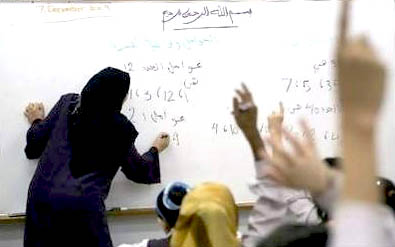
This, the Abu Dhabi Education Council (Adec) explains, will be gradually introduced in public schools, and could be a model that the private schools in the emirate could emulate.
“The new School Organisation Structure will impact all school-based staff, both nationals and expats,” Adec highlighted.
The education body informed that this new frame will be rolled out in batches, and is part of the development and implementation of the new school organisation structure.
“In the first batch, about 80 per cent of our staff have received an increment of 30 per cent or more.
“Till date, about 91 per cent of all national staff (that’s 5,800 employees) has been mapped.
“The second batch is under process and should be reviewed in the next three months.
“The new salaries will be back-dated from the beginning of the current academic year 2013-2014.”
Adec acknowledges that schools might take a while to get familiarised with the new school model, and are taking steps to ensure everyone understands the impact.
“A lot of reference and explanation material has already been published on the internal portal and was earlier communicated to the cluster managers and internal staff.
“Additionally, we will hold a series of meetings with the school principals and vice-principals to offer explanations.”
The authorities have also established a multi-tiered grievance and complaints process to address any shortcomings.
This system, Adec believes will help draw a clear organisation structure for every single school and ensure that the highest levels of efficiency are achieved.
It will also eliminate the “issues of under-staffing notably in the academic position which could jeopardise the smooth running of the schools”.
“The roles and responsibilities of both academic and administrative staff have seen a much-needed improvement and expansion to align with other changes taking place at system level.
“The new pay scale re-examines the compensations and benefits allocated for every single position in the schools, and ensures, by design, that there is room for horizontal growth and development within the job family,” Adec adds.
“This is a variation from the traditional approach of vertical growth by progressions through the ranks (teacher to vice-principal and then to principal), which does not serve Adec’s ultimate goal to support the teachers and help them stay in the classroom where they can give and thrive without worrying about salaries growth and professional development.”
This new step will attract qualified teachers and help tackle issues of retention.
In terms of salary structure, Adec adopted the clean wage design and kept a couple of allowances.
“Beyond the basic salary and supplementary allowance, the new pay scale preserves the social allowance and children allowance that are mandated by law.”
The system is currently being introduced in stages, and the teachers are undergoing several rounds of performance evaluation.
“The professional development plans for teachers and other staff are also based on the results of these evaluations.”
And where it deems fit, Adec provides formal training programmes to help their staff develop and grow.







Comments
Add new comment